Antibody data
- Antibody Data
- Antigen structure
- References [0]
- Comments [0]
- Validations
- Immunohistochemistry [5]
Submit
Validation data
Reference
Comment
Report error
- Product number
- PA5-64121 - Provider product page

- Provider
- Invitrogen Antibodies
- Product name
- KRTDAP Polyclonal Antibody
- Antibody type
- Polyclonal
- Antigen
- Recombinant protein fragment
- Description
- Immunogen sequence: TLGGPEEEST IENYASRPEA FNTPFLNIDK LRSAFKADEF LNWHALFESI KRKLPFLN Highest antigen sequence identity to the following orthologs: Mouse - 38%, Rat - 27%.
- Reactivity
- Human
- Host
- Rabbit
- Isotype
- IgG
- Vial size
- 100 μL
- Concentration
- 0.2 mg/mL
- Storage
- Store at 4°C short term. For long term storage, store at -20°C, avoiding freeze/thaw cycles.
No comments: Submit comment
Supportive validation
- Submitted by
- Invitrogen Antibodies (provider)
- Main image
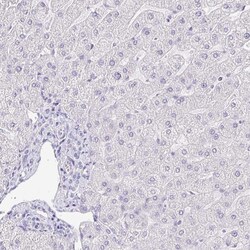
- Experimental details
- Immunohistochemical analysis of KRTDAP in human liver using KRTDAP Polyclonal Antibody (Product # PA5-64121) shows no positivity in hepatocytes as expected.
- Submitted by
- Invitrogen Antibodies (provider)
- Main image
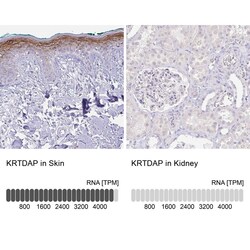
- Experimental details
- Immunohistochemical staining of KRTDAP in human skin and kidney tissues using KRTDAP Polyclonal Antibody (Product # PA5-64121). Corresponding KRTDAP RNA-seq data are presented for the same tissues.
- Submitted by
- Invitrogen Antibodies (provider)
- Main image
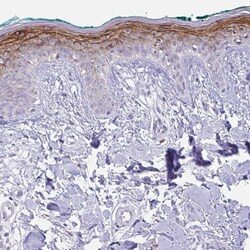
- Experimental details
- Immunohistochemical staining of KRTDAP in human skin using KRTDAP Polyclonal Antibody (Product # PA5-64121) shows high expression.
- Submitted by
- Invitrogen Antibodies (provider)
- Main image
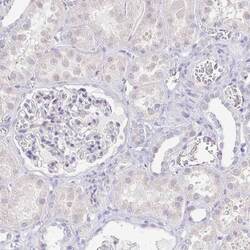
- Experimental details
- Immunohistochemical staining of KRTDAP in human kidney using KRTDAP Polyclonal Antibody (Product # PA5-64121) shows low expression as expected.
- Submitted by
- Invitrogen Antibodies (provider)
- Main image
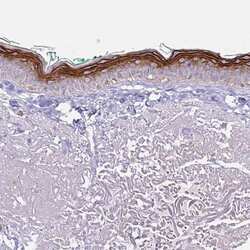
- Experimental details
- Immunohistochemical analysis of KRTDAP in human skin using KRTDAP Polyclonal Antibody (Product # PA5-64121) shows strong cytoplasmic and membranous positivity in keratonocytes.
 Explore
Explore Validate
Validate Learn
Learn Immunohistochemistry
Immunohistochemistry